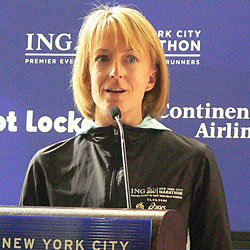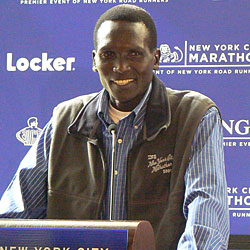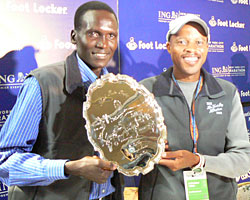|
Elite Athlete Interviews
2006 ING New York City Marathon
The 2006 ING New York City Marathon features an exceptionally strong field of runners - many of whom could win this prestigious event. MarathonGuide.com caught up with a few of these athletes at the press conferences and in one-on-one sessions. Here is some of what we learned about their thoughts on this weekend's marathon and on running and life in general:
Note: We will be adding interviews through the end of Saturday, so return to this page again...
Deena Kastor | Paul Tergat | Henrick Ramaala
Coming soon: interviews w/ Meb Keflezighi, Dathan Ritzenhein, Peter Gilmore, Stefano Baldini, Catherine Ndereba, more...
Deena Kastor
Only three women have ever run a marathon faster than Deena Kastor. Her 2:19:36 finish at London in April 2006 stands as the American record and the eighth fastest women's marathon of all time. Since winning the bronze medal at the 2004 Athens Olympics Marathon, Kastor has just gotten better. Her debut and seventh place finish at the New York City Marathon at the 2001 New York City Marathon was the fastest female Marathon debut in American History. But Kastor's 2004 DNF at New York, aggressively less than 80 days after her Olympic Marathon, puts a mark on her record. With all of her achievements, a win at the 2006 New York City Marathon would complete her running resume and she would become the first American woman to win the USA's largest marathon in thirty years.
How were you first attracted to the marathon distance?
I had never thought that something that took one month to recover from could be good; but in 2001 I did a long run of about 18 miles from my parents home in Southern California to the beach. That was the three miles longer than longest run I had ever done. I felt great and got that runner's high. When I got home, I called my coach to tell him that I wanted to run a marathon. Three months later I was on board to run New York City Marathon. Until five years ago I thought the marathon was a beast and it wasn't until the last year that I considered myself really marathon focused.
Do you have any goals for this marathon?
Last year in Chicago, I didn't have a goal to win, I had a time goal to break 2:20 and I ended up winning although I didn't make the time goal. At London, I kept the time goal to break 2:20 and in Chicago and London I was always staring at my watch. I have reached that time goal and there will be no time goal for New York. My goal for New York is to win and I feel confident that I can.
How do you feel about choosing the NYC Marathon, about not returning to Chicago?
When you pick a race, you have a goal in mind. The toughest thing about not going back to Chicago was calling up Carey Pinkowski, the race director, and telling him that I wasn't going since you tend to build relationships with the race directors. But I had reached my time goal and my main goal now is to win New York.
Why do you want to run New York so much?
For the same reason 93,000 other people want to run it. It's an extraordinary event - one of the top marathon in a city devoted to fitness, with lots of spectator support; a great inspiring start; a finish at Tavern on the Green, one of the most exciting finish lines in the world - and the race's history.
What has your training been like?
130-135 miles per week, charging up hills at the end of long runs to prep for New York. I've gotten a new strength coach and have been incorporating more weights into my training which is something new.
Every night during the week I run 4-6 miles. Monday it's an easy 10-12. Tuesday I run hard intervals in the morning at about 6-8x per one mile repeat. Wednesdays I have a 15 mile hill run. Thursday I train in altitude at about 9,000 feet with 4x two mile repeats. Friday is an easy 10-12 mile run. Saturday a 10-12 mile tempo run. Sunday is a long run of up to 25 miles with hills towards the end. From Monday through Saturday I run 4-6 miles each evening. Sundays are the only days that I don't do an evening run.
How do you think the race will play out?
I'm pretty sure all of the top women will be together for a long time. Most likely the lead pack will stick together until the halfway point or twenty miles. It's so hard to predict the race. This will be a more competitive race than the Olympic games in my opinion.
How are you tapering and what are you doing in your final week?
I'm tapering for one week but am still doing intensity runs despite the drop in mileage. This week I'll just relax and spend more time reading and doing Sudoku. I also like to cook and will use that to take my mind off of things.
Paul Tergat
Paul Tergat holds the world record in the marathon with a 2:04:55 performance at the 2003 Berlin Marathon. He was the winner of the 2005 New York City Marathon by the narrowest margin in the history of the event - just 0.3 seconds ahead of second-place finisher Hendrick Ramaala. Scheduled to compete at the 2006 London Marathon, Tergat withdrew from the field due to the impending birth of his daughter and has taken a full year off from racing.
Was it a hard decision to come back to New York City?
The New York City Marathon was one of the greatest races I have ever run. Hendrick [Ramaala] has said that it was a good win for me last year, but I want to say that it was a painful win. In coming back to NY I know who I have to face... everyone has been racing and is in better shape; but I am in good health and high spirits and we will see what's going to happen.
Has the World Marathon Majors influenced your training?
It's not an issue for me now. I have no points yet. It would not be bad to start something with a win on Sunday, but it will not change my preparation.
In the 2005 race, you ran very hard on First avenue, do you think someone will try that again?
I'm not planning to surge early on First Avenue like last year.
You usually train in Italy... were you able to train there again?
No, not really. I did most of my training at home in Kenya. I do my long runs with Robert Kipkoech Cheruiyot back home…he is my training partner
Do you think it's possible for someone to break the 2 hour mark for marathons?
Take it from me - it's impossible. When I set the world record in Berlin, I could hardly walk after the race. Our half-Marathon was just under 61 minutes..to combine two half marathons like that would be impossible.
What were you thinking when you ran Berlin and got the world record?
I was going for a time, not looking to win the race. Of course since I was aiming for that time goal it's no surprise that I won. Going for the record, there is a lot more pressure watching the clock. For most races you let the pacers lead and you can just focus on the race itself. Going for the win is more comfortable than going for a world record.
You're now 37 years-old, the oldest serious competitor in the field by a longshot. Is age catching up to you?
That's a good question. It's very important, but it's about how you feel. I'll continue to run as long as I feel competitive.
Henrick Ramaala
Henrick Ramaala was the winner of the 2004 New York City Marathon in 2005 and lost the 2005 New York City Marathon to Paul Tergat by just 0.3 seconds. At the 2006 London Marathon, Ramaala set a new PR of 2:06:55, coming in third place just fifteen seconds behind the winner, Felix Limo.
You recently won the Great North Run in Newcastle with a strong 1:01:03. Were you happy with that and was that race a preparation for the New York City Marathon?
I used the Great North Run to get my feet wet. I wanted to gauge myself, but I did not go all out. I feel that I am ready for New York.
How do you feel about the 2006 NYC Marathon compared to 2005?
Overall, I feel prepared - but in a marathon anything can happen. New York is very hard physically and mentally - thre are many variables including the weather. I have prepared and done my training like I always do; but for me the best outcome will be for the winner to have that last 100 meters to throw up his arms and enjoy the win not like last year. That was difficult physically and emotionally. It was tough last year. Hard to lose like that. It was good for Paul. I know Paul is a favorite, having done a 2:04 and he is in great shape - for all of us it is going to be very hard to beat the man, but I wish him luck.
Did last year's close finish change your training in preparation for this year's race?
No, the loss at the finish did not affect my training much. It's not the finish (that is important) - it's how you arrive there. You still have to do all your long runs. I have trained exactly as I have in the past two years.
Anything else about last year's race?
I know that in last year's race I did nothing wrong. I had a great competitor and it resulted in that sort of finish. I did also get something out of it - I learned that the body can take "harsh pain". Normally, I would have let Paul go, given that he was capable of a 2:04 time - but I was dreaming of winning and at one to two miles to go in the race I was not going to give up, so I dug deep. If you dig deep there is always a reserve somewhere.
What is the Outlook for Sunday?
I expect there will be about fifteen in the lead pack - all fast runners. I know you guys want an American to win and Meb will try hard. It will depend on the race itself - but I don't expect the pack to push as hard as last year.
Any final thoughts?
We measure a runner by his results. I have not won a marathon since 2004 and people will not take me seriously if I don't win. I plan to win.
Additional Interviews writeups in the works...
Continuing coverage of the ING NYC Marathon 2006 races:
Post-Race Writeups
The Overview - What Happened?
NYC Marathon 2006: The Men's Race
NYC Marathon 2006: The Women's Race
As It Happens:
2006 ING NYC Marathon Live Race Coverage/ Mile-By-Mile
Pre-Race Coverage
Marathon Elite Lists and Overview
Pre-Race Interviews with top competitors (additional writeups still in progress)
Also, Complete Results of the 2006 ING NYC Marathon
| 






